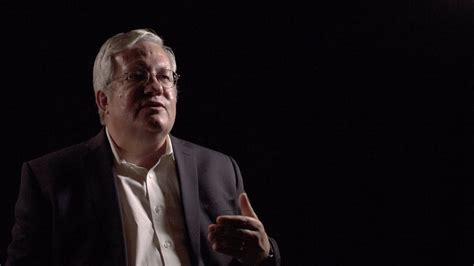A Quote by Wayne Grudem
God does not need us or the rest of creation for anything, yet we and the rest of creation can glorify him and bring him joy.
Related Quotes
Significantly, God in Genesis 1 pronounces the rest of creation "good" before humanity is created. The psalmist and the prophets Isaiah, Jeremiah, and Ezekiel can speak of mountains, trees, sun, and moon praising God. Unlike an office complex or gymnasium, which have no value if people do not inhabit them, creation can glorify and bring God delight apart from human presence.
Man is sitting disconsolate on an anthill one morning. God asks him what the matter is and man replies that the soil is too swampy for the cultivation of the yams which God has directed him to grow. God tells him to bring in a blacksmith to dry the soil with his bellows. The contribution of humanity to this creation is so important. God could have made the world perfect if he had wanted. But he made it the way it is. So that there is a constant need for us to discuss and cooperate to make it more habitable, so the soil can yield, you see.
Why pray? Evidently, God likes to be asked. God certainly does not need our wisdom or our knowledge, nor even the information contained in our prayers ("your Father knows what you need before you ask him"). But by inviting us into the partnership of creation, God also invites us into relationship. God is love, said the apostle John. God does not merely have love or feel love. God is love and cannot not love. As such, God yearns for relationship with the creatures made in his image.
The seventh day of creation is the most eloquent and insightful as to the nature of God. From a literary perspective, the Sabbath forms the pinnacle of the story. Like the dramatic kiss of a soldier returning from war, this is the moment we’re not meant to miss. In choosing rest as the grand finale, God reveals himself as one driven by neither anxiety nor fear but one who finds gladness in both the work of creation and the creation of work.
The logic of cross and resurrection, of the new creation which gives shape to all truly Christian living, points in a different direction. And one of the central names for that direction is joy: the joy of relationships healed as well as enhanced, the joy of belonging to the new creation, of finding not what we already had but what god was longing to give us.
Now, which am I to believe, a book that any impostor might make and call the Word of God, or the creation itself which none but an Almighty Power could make? For the Bible says one thing; and the creation says the contrary. The Bible represents God with all the passions of a mortal, and the creation proclaims him with all the attributes of a God.


































